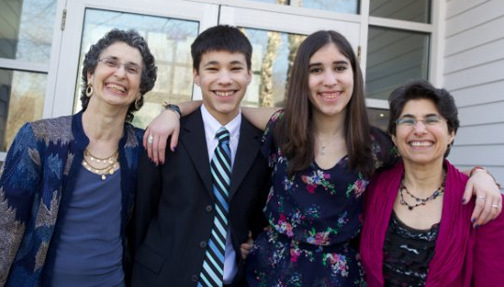Barbara Levine-Ritterman & Robin Levine-Ritterman

Barbara Levine-Ritterman & Robin Levine-Ritterman
Robin Levine-Ritterman grew up in a small town on Long Island as the youngest of four children in a loving family. After graduating from college and then naturopathic school, Robin moved to New Haven, Connecticut to begin her professional career as an acupuncturist and naturopathic physician. One fateful day, when filling in for a colleague, Robin met Barbara, a computer consultant and small-business owner. The two became great friends and quickly developed a strong connection. After Barbara was no longer Robin’s patient, their relationship grew and blossomed into love.
In 1992 Robin and Barbara demonstrated their love and devotion to one another in a commitment ceremony in Middletown, Connecticut before 100 of their close friends and family. As faith is very important to both Robin and Barbara, a Rabbi performed the ceremony and they formalized their commitment by signing a Ketubah, a wedding contract that is an integral part of a Jewish marriage. Robin says the occasion changed the way her family viewed her and Barbara’s relationship, as something strong and permanent. Robin remarks, “My father was initially hesitant to attend, but he came and gave a lovely toast. He realized there was so much love in the room and that it was a good thing.”
In 1995, Robin and Barbara welcomed Maya, their first child, into the world. Their son Joshua followed soon after in 1997. With work, household chores, going to synagogue and caring for their children, they enjoy the busy hum of family life. Robin helps the kids with their homework and Barbara takes Maya to her horseback riding lessons and Joshua to his fencing lessons.
The couple faced a challenge unfortunately familiar to many families in June, 2004 when Barb was diagnosed with breast cancer. Robin cut back on her work schedule to help Barb during her recovery from surgery and chemotherapy. “Barb’s illness made us treasure our relationship even more, but it also made us realize how vulnerable our family was without the legal protections of marriage,” says Robin.
In 2009, after the Connecticut Supreme Court legalized marriage for same-sex couples, Robin and Barbara were married at a New Haven restaurant exactly 17 years to the day of their commitment ceremony. With their extended families in attendance, Maya read a poem she had composed as a tribute to her parents’ love and Joshua also participated in the ceremony with a reading. “We were both thrilled to have legal recognition as a couple and a family, like any other married couple. Clearly we have a life-long commitment to each other. We share finances. We share kids. It’s amazing how nice it is to say, ‘My wife’, says Robin.
Even though Connecticut legally recognizes Robin and Barbara’s marriage and family, the federal government, because of the Defense of Marriage Act (DOMA), does not. DOMA’s disregard for their marriage is particularly difficult for Robin and Barbara at tax time. Because their marriage is legal in Connecticut, they file as married for their state tax returns. But, because DOMA prevents the federal IRS from recognizing their marriage, they have to file their federal taxes as single. To make matters more complicated, because their state tax return is based on the federal return, Robin and Barbara have to put together a mock federal return as a married couple that they do not file with the IRS but is necessary in order to accurately complete their state taxes. They also have to disavow their marriage on federal forms, filing as an “individual” and “head of household.”
Far more difficult than the extra expense and logistics around income tax filing is the emotional impact of DOMA. “It’s horrible when I think about how this affects my kids. To them, it’s so important that we are married and that we are both their parents. Under DOMA, the federal government minimizes the significance of us as a family.” They also can’t help but worry about the safety nets that won’t be there for them should Barb’s cancer return. Although Barb (now 58) has been working full-time since the age of 21, she knows that if she were to die from cancer, Robin, as her spouse, would not be eligible for the Social Security benefit for surviving parents of minor children, something that would help the family survive economically if they lost Barb’s income. In addition, with DOMA, Robin would not qualify for Social Security survivor benefits when she turns 60, as do other surviving spouses.
Despite the discrimination they face under DOMA, Robin and Barbara are hopeful for the future. Looking forward, they aspire to raise their children as good people who will be successful in their adult lives. They are working hard to save money to put Maya and Joshua through college and for their own retirement where they plan to travel and volunteer in their New Haven community.